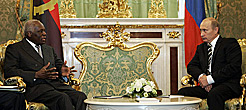Angola: Understanding President Dos Santos’ Rule and succession game

This is a brief narrative of the power struggles between the president and his own party since the establishment of a multiparty system in 1991. It features deployment of constitutional coups, patronage and legal measures to address such internal rifts, as well as the consequences that reverberate today.
The past year witnessed a critical shift in Angolan politics with regular youth-led public protests calling for the President’s resignation. Two factors made the outcry for Dos Santos to step down the main challenge to both the conventional political discourse and public perceptions of power: the 2010 Constitution and the popular uprisings in North Africa.
This paper provides a brief narrative of the power struggles between the President and his own party, since the establishment of a multiparty system in 1991. It addresses the deployment of constitutional coups, patronage and legal measures to address such internal rifts, as well as the consequences that reverberate today.
THE OPPORTUNITY
The 2008 legislative elections offered President Dos Santos the most legitimate, ambitious and unique opportunity to extend his grip on power, as well as to reform the state and its political economy. His ruling party, the Popular Movement for the Liberation of Angola (MPLA) had won by a landslide (81.64 percent). Furthermore, the newfound democratic legitimacy had been magnified by five main elements: double-digit growth rates (an average 14.2 percent real GDP growth of from 2005-2009) , Chinese control of a fast-paced nationwide program of national reconstruction, the squashing of the political opposition, overwhelming international endorsement, and an atmosphere of hope within the country.
Such reforms would, in turn, enable the President to establish the timing and the conditions for his own exit strategy from power. By building strong and democratic institutions, the President would demonstrate great statesmanship in devolving power to the state institutions. These, in turn, would afford the President the legal and political protection for his peaceful retirement in the country.
But the course of events points towards a different political outcome, as will be further explained.
Read the entire analysis, “Understanding President Dos Santos Rule and the Gaming of His Succession”, http://makaangola.org/2012/01/o-poder-e-a-sucessao-de-jose-eduardo-dos-santos/?lang=en">here.
BROUGHT TO YOU BY PAMBAZUKA NEWS.
* Founder of the anti-corruption watchdog Maka Angola, Rafael Marques de Morais is currently a visiting scholar at the African Studies Department at the John Hopkins University (SAIS).
* Please send comments to editor[at]pambazuka[dot]org or comment online at Pambazuka News.
